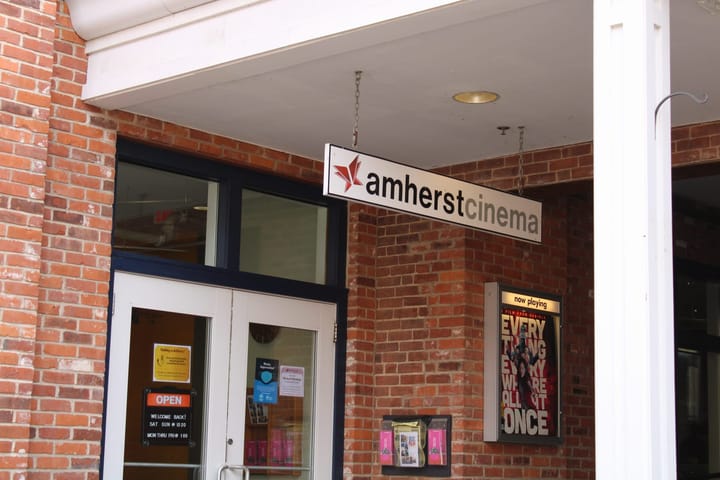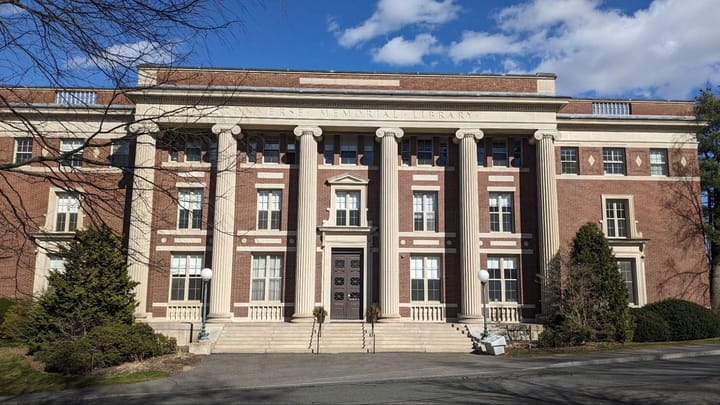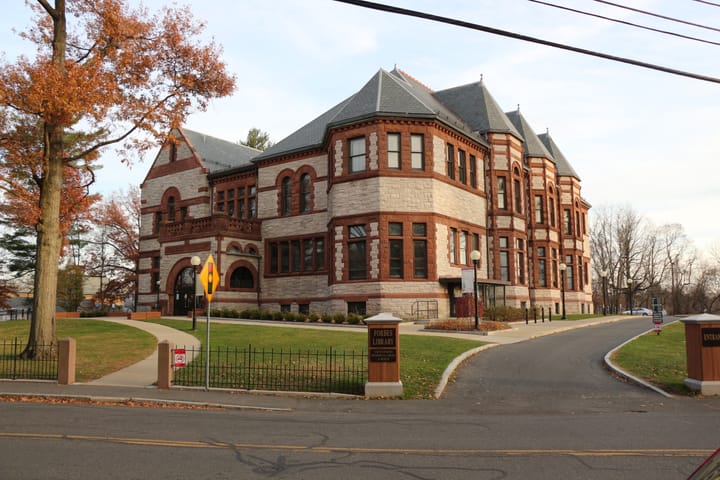Turning up the heat
Swarthout, a history major who currently serves as a student senator and member of the faculty committee on priorities and resources, was recently elected to state board chair of MASSPIRG. He started his work on the campaign to protect the Arctic National Wildlife Refuge soon after he stepped foot on campus. But during high school, environmental activism was nowhere on his resumé. “[Protecting the Arctic is] the campaign that I actually first worked on when I got here first semester freshman year,” he said. “[In high school], I did nothing of this sort but I think it was always there.”
Once the conservationist in him was roused, Swarthout has devoted the last two years to preserving the Arctic Refuge. “The thing about MASSPIRG is that I feel it gives students the ability to actually make change,” he said. “I’m not a science buff, so I think the ability to make change is what’s really moved me to this … [In the future], I’d like to [go into] venture capitalism with an eye to environmentally and socially responsible products.”
“Luke Swarthout impressed me from the start with his ability to combine a deep commitment to environmental activism with an equally deep commitment to scholarly inquiry,” said Professor of Anthropology and Sociology Jan Dizard. “Too often, the former compromises the latter-and vice versa … the pursuit of understanding does not preclude taking action; rather understanding improves the likely soundness of actions in the ‘real world.'”
Through MASSPIRG, Swarthout was introduced to ECOPledge.com, a corporate campaign and offshoot organization of the PIRGs. Students who take the ECOPledge agree not to work for certain companies until they improve their environmental and human rights records. ECOPledge has successfully pushed Coca-Cola, for instance, to increase their recycled product content, after keeping Coca-Cola on its list for several years. Currently, about 100,000 students have signed the ECOPledge, which has banned companies such as Staples, Sprint and British Petroleum.
“As college students, this is an asset that we control and that companies really care about,” said Swarthout. “Not only are 100,000 students pledging; but, in terms of the publicity, they don’t like being on the list. They’re escalating tactics, so it starts with [the company] simply being on the list, [then we] start discussions, then there’s a job boycott, all the way up to a consumer boycott.”
With the support of ECOPledge and the U.S. Public Interest Research Group (U.S. PIRG), 10 students traveled to London to protest British Petroleum’s plan to drill in the Arctic Refuge. “The role of the students was to raise awareness on the issue in the British community through the press and through grassroots organizing,” said Swarthout. “We did flyering and direct dialogue at the shareholders’ meeting; we were making our presence known. [It was] just really some great grassroots organizing. We had two or three thousand individual conversations with people. So the idea of making people more aware of the issue was definitely a success and we all had fun, too, which is a big part of it.”
The protest in London was part of a greater mission with the coalition, which includes the World Wildlife Fund, U.S. PIRG, Trillium Acid Management, and Green Century Fund, and was only one part of the multi-faceted campaign to save the Arctic National Wildlife Refuge. “There are two ways you can stop drilling in the Arctic: if it never gets opened up and if nobody’s willing to drill there,” said Swarthout. “So you go for as many angles as you can.”
The element of surprise
As part of the protest, the students sailed a large, inflatable caribou down the Thames River with a sign, “Be green BP Protect the Arctic Refuge.” “We did it last year but they kicked us off,” said Swarthout. “BP is on the Royal Festival Hall on the south bank of the Thames but that’s, in fact, owned by Shell, ironically. They apparently lend it, lease it, rent it out to the government and the public, but it’s private property. To solve this problem, we got a workboat and floated the caribou up the Thames, which is public.”
The group also did ECOPledging around London and signed up almost 1,000 British young people. “We also went to BP offices and asked for a meeting with their chairman,” said Swarthout. “They were so flustered that they accepted the [list of] ECOPledges. And we brought them resumes of 100 students in the U.S. and said, ‘These are the students who won’t work for you.’ They were so flustered because we had a camera and [so] they actually took them, which is something that they are patently not supposed to do.”
Swarthout has been acting as a press officer for the campaign, which has received considerable attention from both national and international news sources. Their trip was covered by all the major newspapers in London and media in the U.S. and Australia. Last year, it was covered by CBS Radio, Reuter’s and BBC, among others. “I was the only person to go over two years in a row,” he said. “It’s something that I’ve sort of assumed, because of my experience, because it’s also a skill I’ve acquired from other places and it interests me. So disseminating the information and making people aware of it was something that I really wanted to focus on,” said Swarthout.
The timing of the trip was especially significant because it was centered on the annual British Petroleum shareholders meeting. “Because of this issue, because of drilling in the Arctic Wildlife Refuge, there’s a definite threat of job loss-there is an economic side to this,” said Swarthout. “There’s a student from Oregon State University who spoke at the meeting and asked the question, ‘Does it alarm you that a significant number of students you would hope to draw from in your future employees have pledged not to work with you, considering you definitely need the engineers of the world to make your profits for the future? And yet something you’re doing is alienating a large section of the population.’ It was a powerful message and one that people were surprised and interested to hear.”
A coalition of international environmental organizations and investment groups, especially socially responsible investment groups (SRIs), has been working for the past two years to encourage BP not to drill in the Arctic. According to Swarthout, ethical investing, a type of socially responsible investing, has been one of the tactics employed by the coalition to protect the Arctic Wildlife Refuge.
“You invest in companies that are sort of good and you try to make them better by voting their shares,” said Swarthout. “So you have shareholder meetings every year and you put resolutions on the ballot and stockholders vote on them. Part of the reason the coalition has been drawn to BP is because BP has pushed its ‘green image’ more heavily than other companies. They, in fact, briefly changed their name from British Petroleum to Beyond Petroleum, making people think that they were going to get beyond oil.”
Unlike other oil companies, BP has publicly proclaimed itself as an environmentally conscious company. “Nobody is going to argue that BP isn’t better than the rest of the oil companies-Exxon Mobil is perfectly happy to be this giant dinosaur of an oil company-but BP has shown an interest in pushing its ‘green image,'” he said. “And so, a lot of the reason people follow up on them and why they are targeted is because we want them to live up to their green image.”
Two years ago, U.S. PIRG initiated a proposal not to drill in the Arctic National Wildlife Refuge, which received a 13 percent vote in favor of it. “[It] sounds like nothing but it is huge-a huge mandate of sorts for an oil company to show that this large percentage of stockholders didn’t really believe in [drilling],” said Swarthout. “Because of our success two years ago, they prevented us from placing a resolution on the ballot last year.”
Melting the ice
This year, however, a new stockholder resolution was presented at the shareholders meeting and received an 11 percent vote in favor of it. “The reason for the new resolution this time was because it’s our belief that you’re not actually making a lot of money at the Arctic Wildlife Refuge,” said Swarthout. “The resolution uses the Arctic as a case study as someplace where it wouldn’t be a legitimate investment. It’s very expensive to drill there, it’s under high scrutiny, it’s costing a lot to open up, it’s taking a lot of time, it’s hard to come out of there and it’s costing a hit for their image.”
By directly asking British Petroleum to disclose shareholder risk for drilling in culturally and environmentally sensitive areas, the resolution was essentially questioning whether drilling in the Arctic was in the best interest of the company in general.
“Eleven percent is huge for a first-year resolution and for a resolutions that the company had come out very strongly against. Especially because from backroom discussion there were a number of SRI groups that abstained, despite initially supporting the resolution, so the vote could’ve, in fact, been higher,” said Swarthout. “Anything double digits forces the company to dig down, have a lot of conversations and start addressing the issue. This one is even bigger because it’s not just ‘don’t drill in the Arctic,’ it’s ‘we disagree with the way you’re running the company.'”
According to Swarthout, most people’s expectations did not exceed three or four percent. “Eleven is great and [BP] knows it too,” he said. “BP is openly very, very upset because of the publicity they keep getting calling on themselves to uphold their ideals. They keep saying they’re a green company and we keep saying, ‘If you say you are; act like one.’ That was the message that we brought there: if you really are a green company, if you really are what you say you are, don’t drill in the Arctic National Wildlife Refuge.”
Three hours after the shareholders meeting, the coalition learned that the Senate voted to protect the Arctic. “The next step is going to be a lot more discussion with BP and from there we may escalate our response,” said Swarthout. “If they’re not out [of Alaska] by next year, there will be another resolution, which will be more explicitly about protecting the Arctic National Wildlife Refuge.”
MASSPIRG students have chosen not to work on the campaign to protect the Arctic Refuge this semester. “The Massachusetts reps are champions on this issue so there are other issues we’ve chosen to focus on because we don’t need to push our Senators,” said Swarthout. “Even though we’re not working on the issue this semester, the BP vote is a huge victory for Amherst College and MASSPIRG in general.”





Comments ()